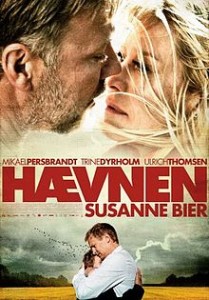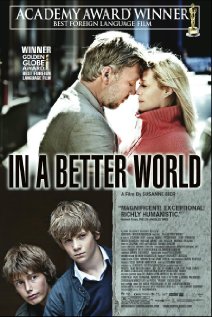 The original title means “revenge” in Danish, but the English title is “In a Better World” and the Japanese translation is “To You Who Live in the Future”; the English and Japanese titles are not literal translations of the original title, but it is very interesting how they each seem to symbolize a different layer of the theme.
The original title means “revenge” in Danish, but the English title is “In a Better World” and the Japanese translation is “To You Who Live in the Future”; the English and Japanese titles are not literal translations of the original title, but it is very interesting how they each seem to symbolize a different layer of the theme.
Anton is a Swedish doctor who works at a refugee camp in Africa (probably Sudan) and is separated from his wife Marianne living in Denmark. Their son Elias is bullied in school. One day, a boy named Christian transfers from London into Elias’s class. Christian’s father Claus, after his wife died, moved with his son to Denmark where Christian’s grandmother lives. Elias does not resist the bullying he faces, but Christian convinces him that the bullying will continue forever if he doesn’t fight back and beats up the leader of the bullies. The bullies notice this and stay away from Christian. Christian, having lost his mother, and Elias, possibly losing his father in a divorce, are drawn to each other and a strong friendship buds.
 Christian and Elias witness Elias’s father Anton being hit one-sidedly by an unreasonable man. When the boys insist that he ought to retaliate, Anton warns them that, if you retaliate violence with violence, the violence will continue to grow. When he returns to Africa, Anton provides medical care to a young pregnant woman whose abdomen was cut open by the rebel army general, but the woman dies despite treatment. The general comes there seeking medical treatment for a wound. The camp’s medical staff refuses to provide medical treatment, but Anton treats him, feeling it is his duty as a doctor. After treatment, though, the general shows his arrogance and expresses contempt toward the dead pregnant woman, so eventually Anton’s rage peaks and he yells, “Get out of here!” Hearing Anton’s words, the refugees who had until now refrained from acting, out of respect for Anton, proceed to beat the general to death.
Christian and Elias witness Elias’s father Anton being hit one-sidedly by an unreasonable man. When the boys insist that he ought to retaliate, Anton warns them that, if you retaliate violence with violence, the violence will continue to grow. When he returns to Africa, Anton provides medical care to a young pregnant woman whose abdomen was cut open by the rebel army general, but the woman dies despite treatment. The general comes there seeking medical treatment for a wound. The camp’s medical staff refuses to provide medical treatment, but Anton treats him, feeling it is his duty as a doctor. After treatment, though, the general shows his arrogance and expresses contempt toward the dead pregnant woman, so eventually Anton’s rage peaks and he yells, “Get out of here!” Hearing Anton’s words, the refugees who had until now refrained from acting, out of respect for Anton, proceed to beat the general to death.
 In Denmark, Christian decides to get revenge on the man who had hit Anton by blowing up the man’s car. Elias is skeptical of this act, but is drawn in and does it together with Christian. Just before the explosion, they see some strangers—a mother and her child—jog toward the car; Elias jumps out to rescue them and gets hit by the explosion. Christian is investigated by the police and, believing Elias had died, plans to throw himself to his death.
In Denmark, Christian decides to get revenge on the man who had hit Anton by blowing up the man’s car. Elias is skeptical of this act, but is drawn in and does it together with Christian. Just before the explosion, they see some strangers—a mother and her child—jog toward the car; Elias jumps out to rescue them and gets hit by the explosion. Christian is investigated by the police and, believing Elias had died, plans to throw himself to his death.
 “Revenge” – The movie of this title depicts revenge and its consequences. Marianne could not forgive her husband Anton’s affair. Because of this, Anton goes to Africa which makes Elias feel sad; Elias finds comfort from Christian who helps him, and Elias ends up bombing the car with Christian. Christian believes his own father wished for the death of Christian’s mother suffering from terminal cancer and he can’t forgive his father for letting his mother die. With nowhere to direct his anger, Christian channels it into the revenge he seeks on the bully and the man who unreasonably hits people. Even though Anton disapproves of revenge, he can’t tolerate the rebel army general who was amused by cutting the abdomen of the young pregnant woman. The African husband of the woman who died beats the general to death. This movie expresses that people seek revenge when they are hurt, no matter how trivial or how brutal the act that hurt them is.
“Revenge” – The movie of this title depicts revenge and its consequences. Marianne could not forgive her husband Anton’s affair. Because of this, Anton goes to Africa which makes Elias feel sad; Elias finds comfort from Christian who helps him, and Elias ends up bombing the car with Christian. Christian believes his own father wished for the death of Christian’s mother suffering from terminal cancer and he can’t forgive his father for letting his mother die. With nowhere to direct his anger, Christian channels it into the revenge he seeks on the bully and the man who unreasonably hits people. Even though Anton disapproves of revenge, he can’t tolerate the rebel army general who was amused by cutting the abdomen of the young pregnant woman. The African husband of the woman who died beats the general to death. This movie expresses that people seek revenge when they are hurt, no matter how trivial or how brutal the act that hurt them is.
“In A Better World”— Perhaps this could be rephrased as “In an Ideal World” where everyone understands each other and there isn’t violence, but since this is only an ideal, this movie depicts the reality where people hurt each other. Or perhaps this title compares the irrational society of Sudan in a war to Denmark which is said to be the most calm and peaceful society among European nations; perhaps it wishes to draw attention to the violence that lurks within the peace of Denmark in various other forms. Do we fight violence with violence? Ignore it? Tolerate it? Or is there a better method? This movie ends without offering an answer.
“To You Who Live in the Future”— Adults say that violence is wrong, but perhaps this is hypocritical. Adults have their hands full dealing with their own problems. Looking at these adults, we hope that the next generation lives differently.
The strongest feeling I got from this movie was, “We don’t know what comes next in life.” There are only a few characters in this story, but at least six people nearly died. The mother and child who by chance were jogging near the car; Elias who protected them; Christian who was about to jump to his death if Anton hadn’t saved him; the bully that was punished by Christian; and Anton, having gained the animosity of the rebel army and angering the unreasonably violent man who hit him, could have been killed. Parents try very hard to raise children. However, children drift away in unexpected directions when their parents have their hands full every day with hard work and their own troubles and don’t have time to think of their children. Fortunately, these family and friends don’t die, but this movie shows how small mistakes, no matter how small, could lead to tragic consequences.
